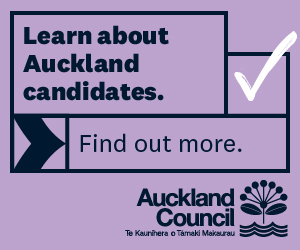
Auckland Council

Freshwater
The worsening state of New Zealand’s lakes and rivers is a major challenge for regional councils, which play a leading role in managing freshwater in their areas. To this end, regional councils create plans to protect water resources from contaminants and overuse.

Freshwater
The worsening state of New Zealand’s lakes and rivers is a major challenge for regional councils, which play a leading role in managing freshwater in their areas. To this end, regional councils create plans to protect water resources from contaminants and overuse.
Invest to improve water quality, improve beaches, and improve coastal infrastructure to protect against flooding and erosion.
Enable pollution prevention, strengthen enforcement, improve infrastructure and waste management to ensure clear waterways.
Invest in zero waste initiatives: support community partners, eg Kaipātiki Project and our community centres with recycle cafes and education.
Work to improve the runoff from private properties into creeks, and streams, so that beach water quality is improved.
Work with local communities to increase the planting of trees and ground cover to help reduce the sediment and pollutant runoff.
Increase the areas of wetlands to assist in filtering the water runoff from residential properties.
Support the use of rainwater retention tanks.
Support the implementation of biological filtration systems at water outlets.
Support industry education, monitoring and enforcement.
Upgrade our infrastructure to reduce leaks and overflows. Continue to increase building site compliance to reduce sediment in our waterways.
Daylight streams and build more blue-green infrastructure, like our Te Ara Awataha Northcote Greenway for biodiversity and better water quality.
Implement Auckland's Water Strategy which I led as Environment and Climate Change Committee Chair and received support from community and council.
Increase efforts to monitor water quality of fresh water sources near large scale housing and infrastructure development sites.
Monitor the impact of the level of pesticides and fertilizers used in agriculture through mandatory reporting by the supply chain.
Set biodiversity targets including monitoring of vulnerable species including removal of unwanted pests and contaminants in specific sites.
Oppose Three Waters reform including stormwater assets and management, being inextricably linked to land-use planning functions of council.
Make green infrastructure mainstream, with rain gardens, rainwater tanks, urban wetlands, green walls and roofs and permeable surfaces.
Invest to improve water quality, improve beaches, and improve coastal infrastructure to protect against flooding and erosion.
Enable pollution prevention, strengthen enforcement, improve infrastructure and waste management to ensure clear waterways.
Invest in zero waste initiatives: support community partners, eg Kaipātiki Project and our community centres with recycle cafes and education.
Work to improve the runoff from private properties into creeks, and streams, so that beach water quality is improved.
Work with local communities to increase the planting of trees and ground cover to help reduce the sediment and pollutant runoff.
Increase the areas of wetlands to assist in filtering the water runoff from residential properties.
Support the use of rainwater retention tanks.
Support the implementation of biological filtration systems at water outlets.
Support industry education, monitoring and enforcement.
Upgrade our infrastructure to reduce leaks and overflows. Continue to increase building site compliance to reduce sediment in our waterways.
Daylight streams and build more blue-green infrastructure, like our Te Ara Awataha Northcote Greenway for biodiversity and better water quality.
Implement Auckland's Water Strategy which I led as Environment and Climate Change Committee Chair and received support from community and council.
Increase efforts to monitor water quality of fresh water sources near large scale housing and infrastructure development sites.
Monitor the impact of the level of pesticides and fertilizers used in agriculture through mandatory reporting by the supply chain.
Set biodiversity targets including monitoring of vulnerable species including removal of unwanted pests and contaminants in specific sites.
Oppose Three Waters reform including stormwater assets and management, being inextricably linked to land-use planning functions of council.
Make green infrastructure mainstream, with rain gardens, rainwater tanks, urban wetlands, green walls and roofs and permeable surfaces.
Mayor
Compare the mayoral candidates in your area
Local council
Compare the candidates for your city or district council
Regional council
Compare the candidates for your regional council
Local board
Compare the candidates for your local or community board










